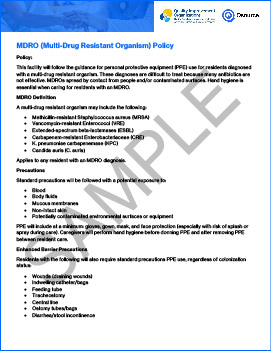Is the healthcare industry adequately prepared to handle infections in an increasingly complex world? A bold statement must be made: Enhanced Barrier Precautions (EBP) have emerged as a crucial tool for safeguarding patients and healthcare workers alike. This approach, which focuses on targeted gown use and other protective measures, addresses the shortcomings of traditional standard precautions by accounting for both active infections and colonization.
The necessity for Enhanced Barrier Precautions has become undeniable within modern healthcare facilities. Standard protocols often fall short when dealing with colonized residents who may not exhibit overt symptoms but still pose transmission risks. The EBP toolkit developed by HQIN.org provides comprehensive guidance to bridge this gap. By emphasizing proactive measures such as appropriate PPE usage during specific care activities, these precautions aim to create safer environments for all individuals involved in patient care. Nurses and other healthcare professionals are increasingly recognizing the importance of adopting these practices to mitigate potential outbreaks effectively.
| Bio Data & Personal Information | Career & Professional Information |
|---|---|
| Name | Dr. Peggy Fossen DNP, RN, CNE |
| Date of Birth | Not disclosed publicly |
| Place of Birth | United States |
| Education | Doctorate in Nursing Practice, Registered Nurse Certification, Certified Nurse Educator |
| Professional Affiliations | ShiftKey Peer Review Committee Member |
| Specialization | Infection Control, Enhanced Barrier Precautions Implementation |
| Reference Website | HQIN.org |
Despite the availability of resources like the EBP toolkit, challenges remain in ensuring widespread adoption among healthcare providers. One significant hurdle lies in educating staff about Enhanced Barrier Precautions through effective training programs. For instance, many nurses seeking answers to quizzes related to ShiftKey's EBP assessments turn to online platforms like TikTok or Quizlet for study materials. While these sources can provide valuable insights, they underscore the need for more structured learning opportunities directly integrated into professional development curricula.
Defining infection itself plays a critical role in implementing proper preventive measures. An infection occurs when germs invade the body and cause illness, necessitating clear guidelines for intervention. Enhanced Barrier Precautions represent an innovative strategy designed specifically to address situations where standard precautions prove insufficient. In Wisconsin, regulatory updates emphasize the application of these principles to protect public health while promoting safety across various care settings.
Aseptic procedures form another cornerstone of infection control strategies under the umbrella of Enhanced Barrier Precautions. Key components include identifying key parts and sites requiring special attention, utilizing personal protective equipment appropriately, adhering to standard precautions consistently, and maintaining sterile techniques during surgical interventions. Each element contributes significantly toward reducing cross-contamination risks and enhancing overall patient outcomes.
Permission to retake assessments forms part of ongoing efforts to reinforce learning and competency verification processes within healthcare organizations. Decisions regarding retesting typically rest with entities like ShiftKey, which oversee certification programs tied to Enhanced Barrier Protection implementation. These mechanisms ensure that practitioners remain current with evolving best practices while fostering accountability throughout their careers.
As the healthcare landscape continues to evolve, embracing Enhanced Barrier Precautions becomes ever more vital. By prioritizing education, consistent application of established protocols, and continuous improvement initiatives, the industry moves closer to achieving its ultimate goal—safeguarding the well-being of every individual entrusted to its care.



